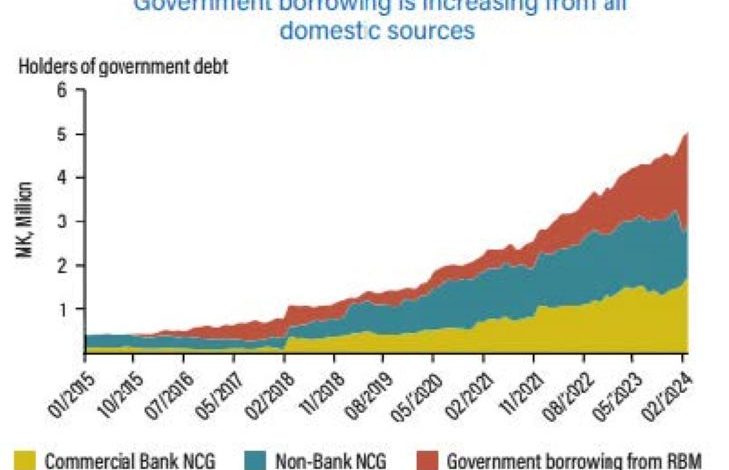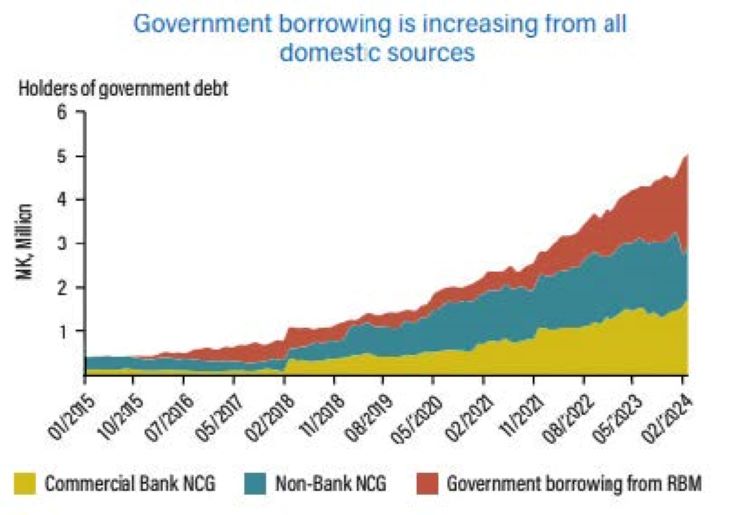Can fiscal disciplipne, IFMIS rescue Malawi?

Malawi is facing a severe debt crisis, with its public debt reaching K15.17 trillion.
This represents 81 percent of the country gross domestic product (GDP), which is 1 600 basis points above the 65 percent threshold recommended by global financial institutions.

The international community, including the World Bank and the United States, is alarmed by this unsustainable debt burden and is urging the Malawi Government to take decisive action to stabilise its finances.
According to economic analysts, the keys to addressing Malawi’s debt crisis are fiscal consolidation and the full implementation of the Integrated Financial Management and Information System (Ifmis). These interrelated strategies, if properly executed, could offer hope for restoring fiscal discipline, fostering economic growth and addressing the country’s mounting debt.

Fiscal consolidation is not merely about reducing public expenditure, rather it involves a more nuanced approach that seeks to achieve sustainable fiscal policies through efficient revenue and expenditure management, according to Scotland-based Malawian economist Velli Nyirongo.
This process involves cutting down on unnecessary government spending, enhancing revenue collection through measures such as broadening the tax base and improving enforcement mechanisms and negotiating with creditors to restructure existing debt obligations.
One of the primary challenges facing Malawi is the reduction of wasteful government expenditure. Inefficiencies within public administration, exacerbated by corruption and inflated procurement costs, have significantly contributed to the current fiscal crisis.
Mika Saito, an advisor at the International Monetary Fund (IMF), said after her team’s mission to Malawi that addressing these inefficiencies could free up critical resources and restore confidence in government institutions.
In addition to reducing expenditures, enhancing revenue collection is a crucial aspect of fiscal consolidation. Malawi’s revenue collection system is inefficient, with widespread tax evasion and poor administration.
Improving tax compliance and enforcement could generate the much-needed revenue to cover essential services without resorting to excessive borrowing.
International financial institutions such as the World Bank and IMF maintain that restructuring Malawi’s existing debt is necessary to ease the immediate pressure on public finances. However, debt restructuring alone will not suffice; fiscal reforms must be implemented to prevent a relapse into unsustainable borrowing.
Closely linked to fiscal consolidation is the implementation of the Integrated Financial Management and Information System (Ifmis), a centralised system designed to streamline government financial processes.
Business Partners International country manager Bond Mtembezeka believes Ifmis holds the potential to transform Malawi’s public financial management by enhancing accountability, transparency and efficiency across government departments.
“At full deployment Ifmis provides real-time data on government expenditure, revenues and debt, therefore, it becomes easier to track and locate inefficiencies and bleeding areas soon enough.
“Further Ifmis automates processes and brings in controls which has great potential to lessen corruption,” said Mtembezeka.
A fully integrated Ifmis would reduce corruption by offering better interconnection, internal control over transactions, eliminate unnecessary duplications and achieve comprehensive coverage in Ifmis, according to the memorandum of economic and fiscal policies the government signed with the IMF as part of the four-year $175 million (about K306 billion) Extended Credit Facility.
Nyirongo said the integration of planning, budgeting, procurement and payment systems that the Ifmis will allow for better budget control and ensures that “spending remains within approved limits, thereby enhancing fiscal discipline”.
In a country where public sector corruption has been a major impediment to economic development, the system provides an essential tool for ensuring that funds are not diverted to unauthorised uses or lost to inefficiencies.
Moreover, Ifmis can play a vital role in enhancing budgetary control, which is essential for fiscal consolidation. Malawi’s budget execution has often been plagued by overspending and the accumulation of arrears, which undermine fiscal discipline.
Ifmis helps prevent this by linking expenditure commitments directly to the availability of funds, thereby ensuring that government departments do not spend beyond their allocated budgets.
The system also provides real-time financial reporting, allowing policymakers to monitor budget execution more closely and make informed decisions.
The system also supports debt management by improving the government’s ability to manage its cash flow and prioritise debt repayments. This is particularly important given the warnings from international lenders about the dangers of unsustainable domestic borrowing.
By helping to align revenue collection with expenditure, Ifmis reduces the government’s reliance on domestic borrowing, which has proven costly and detrimental to private sector growth.
Furthermore, with timely and accurate financial reports generated by Ifmis, the government is better equipped to plan its debt servicing strategy, ensuring that it meets its obligations without compromising essential services.
However, the successful implementation of Ifmis is not without its challenges. Malawi’s public financial management system has long been beset by governance issues, political resistance, and limited technical capacity.
Moreover, political will is crucial to the success of both Ifmis and fiscal consolidation efforts, says Nyirongo.
He said: “International partners can support this initiative by providing funding, technical assistance, and capacity-building programmes, as well as conducting independent assessments to ensure global standards of transparency and efficiency are met.”
The rollout of Ifmis has been delayed by logistical and operational hurdles, and there is a need for significant investment in training public officials to use the system effectively.
The government initially agreed to fully roll out the Ifmis in the original Staff-Monitored Program with Executive Board Involvement (PMB) signed in September 2022, but was carried over to this edition of the ECF.
Without a genuine commitment from government leaders to enforce financial discipline and hold corrupt officials accountable, the benefits of these reforms may not be fully realised.
Thus, fiscal consolidation and the implementation of Ifmis offer a viable path for addressing Malawi’s growing debt crisis. By improving financial accountability, enhancing budgetary control, and reducing reliance on domestic borrowing, these strategies can help restore fiscal discipline and promote sustainable economic growth.
However, their success depends on the government’s willingness to confront entrenched corruption, enforce financial reforms, and invest in the necessary institutional capacity.
If these measures are implemented effectively, Malawi could regain control of its public finances and lay the foundation for a more stable and prosperous future. n




